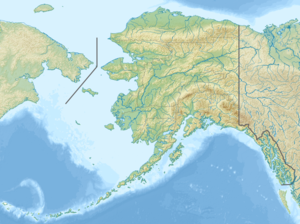White River (Yukon)
Appearance
| White River | |
|---|---|
 White River near Beaver Creek, Yukon | |
| Native name | Tadzan ndek (Hän) |
| Location | |
| Countries |
|
| State/Territory | |
| Census Area | Valdez–Cordova in Alaska |
| Physical characteristics | |
| Source | Russell Glacier |
| • location | Wrangell–St. Elias National Park and Preserve, Saint Elias Mountains, Alaska |
| • coordinates | 61°40′18″N 141°50′01″W / 61.67167°N 141.83361°W[1] |
| • elevation | 4,258 ft (1,298 m)[2] |
| Mouth | Yukon River[1] |
• location | 12 miles (19 km) upstream of the mouth of the Stewart River, Yukon |
• coordinates | 63°11′24″N 139°35′23″W / 63.19000°N 139.58972°W[1] |
• elevation | 2,129 ft (649 m)[1] |
| Length | 200 mi (320 km)[3] |
The White River (French: Rivière Blanche; Hän: Tadzan ndek) is a tributary about 200 miles (320 km) long, of the Yukon River in the U.S. state of Alaska and the Canadian territory of Yukon.[3] The Alaska Highway crosses the White River near Beaver Creek.
The White River is glacier-fed and contains large amounts of suspended sediment. It transports 19 million tons of sediment per year in the upper part of its basin.[4] This dramatically changes the clarity of the Yukon River, which remains sediment laden from the confluence to its mouth.[4]
See also
[edit]References
[edit]- ^ a b c d "White River". Geographic Names Information System. United States Geological Survey. January 1, 2000. Retrieved November 10, 2013.
- ^ Derived by entering source coordinates in Google Earth.
- ^ a b Orth, Donald J.; United States Geological Survey (1971) [1967]. Dictionary of Alaska Place Names: Geological Survey Professional Paper 567 (PDF). University of Alaska Fairbanks. p. 1044. Retrieved November 10, 2013.
{{cite book}}: Unknown parameter|agency=ignored (help) - ^ a b Transport of Water, Carbon, and Sediment Through the Yukon River Basin

